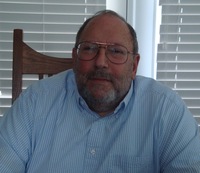 Robert Dickler completed a master’s degree and doctoral coursework at the University of Minnesota as well as a residency program at University Hospital in 1972. He served in several administrative positions over the course of his ten years at the Hospital. He worked at the University of Colorado from 1981 to 1987, until he returned to Minnesota in 1987 as General Director of University Hospitals and Clinics and Assistant Vice President of the Academic Health Center. He served in this position until 1992.
Robert Dickler completed a master’s degree and doctoral coursework at the University of Minnesota as well as a residency program at University Hospital in 1972. He served in several administrative positions over the course of his ten years at the Hospital. He worked at the University of Colorado from 1981 to 1987, until he returned to Minnesota in 1987 as General Director of University Hospitals and Clinics and Assistant Vice President of the Academic Health Center. He served in this position until 1992.
Interview Abstract
Robert Dickler begins his interview with a brief timeline of his education and career. He relates how he decided to attend the University of Minnesota and his experiences as a graduate student during a period of social change. He discusses his interactions with Gaylord Anderson and Lee Stauffer, the influence of the Alumni Foundation, and working with Vernon Weckwerth. He describes completing his residency at University Hospital as a student of John Westerman, the “virgin territory” of hospital administration education, the changes in financial support for hospital administration, and, on a related note, the changes in hospital technology. He discusses the key issues the Hospital confronted in the 1970s, including the information explosion and new levels of bureaucratic accountability. He then discusses the importance of focused governance in a university hospital and the building of the Ambulatory Care Clinic. He reviews the relationships between the hospital and schools within the Academic Health Center, with siginicant detail on nursing. Mr. Dickler also discusses unionization within the Hospital and the health sciences, the changing patient experience, the effects of abortion legislation on hospital policies, University Hospital’s relationship with community hospitals, growing competition within the healthcare industry, University Hospital’s mission, and the growth of the clinical care dollar. The interview turns toward the following topics: the 1970s (and continuing) nursing shortage, Mr. Dickler’s move to the University of Colorado, the differences in hospital administration at Colorado and Minnesota, the outbreak of AIDS, structural change at Colorado, his return to Minnesota, pay equity, the tax exempt status of nonprofit hospitals, town/gown tensions, and his move to the American Association of Medical Colleges (AAMC). He describes his time at the AAMC with attention to health reform under the Clinton administration, the relationship between the AAMC and the American Medical Association. He concludes with a discussion of the relationship between Minnesota’s University Hospital and the Veteran’s Administration Hospital and his relationships with Lyle French, David Preston, and Cherie Perlmutter.
Biographical Sketch
Robert Dickler was born and raised in Chicago, Illinois. He attended Western Reserve University (now Case Western Reserve) for a degree in history of religion and comparative religion. After graduating in 1967, he worked in a state mental hospital in Cincinnati, Ohio, which prompted his interest in healthcare administration. He completed a master’s degree and doctoral coursework at the University of Minnesota as well as a residency program at University Hospital in 1972. He served in several administrative positions over the course of his ten years at the Hospital. He then moved to the University of Colorado as Director of University Hospital in 1981. He returned to Minnesota in 1987 as General Director of University Hospital and Clinic and Assistant Vice President of the Academic Health Center. In 1992, Mr. Dickler left the University to serve as Senior Vice President in the Division of Health Care Affairs and then Chief Health Care Officer at the Association of American Medical Colleges. He retired in 2009.
Interview Transcript